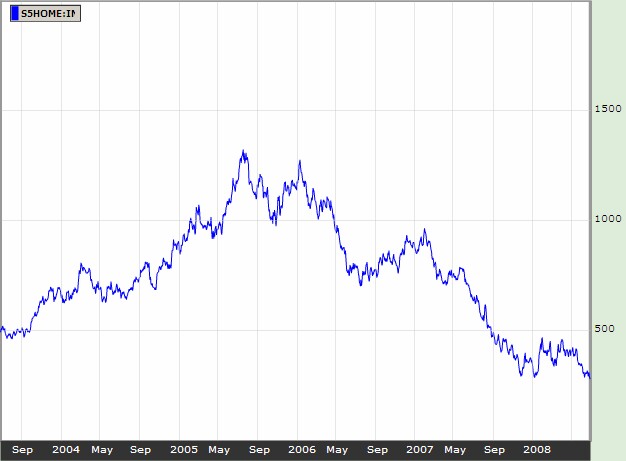It seems like everyone in the Chicago area is trying to time the real estate market these days. Sellers are holding out for higher prices, convinced that the market is going to turn around any day now and they are going to make 50% on the home they bought 5 years ago. Buyers, on the other hand, are waiting on the sidelines for sellers to capitulate on their asking prices, fearing that they might otherwise buy a house that goes down 10% within the first year. The question on everyone’s mind is whether or not home prices in Chicago have bottomed out yet.
In general, trying to time any market is a risky proposition since you don’t really know until after the fact whether or not you bought at the bottom or sold at the top. It’s especially tricky with real estate because you have to really time the size of your mortgage payment, which is a combination of prices and interest rates. It doesn’t do you any good to buy at the bottom if interest rates have jumped up and more than offset the impact of declining prices. For instance, from May to June interest rates have shot up 60 basis points, which is enough to raise your mortgage payments by 6.6%. I also maintain that you shouldn’t look at a house as an investment in the first place because first and foremost it’s a place to live. Do you really want to spend the next 7 years of your life in a house that you picked based upon its assumed appreciation potential?
But let’s move beyond how I think you should be looking at the Chicago real estate market and let’s try to answer the question you are going to ask anyway. I can offer you three different sets of data that might shed some light on where Chicago is in the home price cycle.
First, the stock market is usually pretty good at predicting the future. Stock prices usually reflect what is about to happen to the economy, bottoming in advance of an economic bottom. For this perspective we can look at the S&P Homebuilders index over the last 5 years.
As you can see this index peaked in the first half of 2005 so it did a pretty good job of predicting the housing meltdown more than a year in advance of the peak. Unfortunately, there is no evidence that it has bottomed out yet. The groundhog has seen it’s shadow.
Another financial market that provides a glimpse into the future is the futures exchanges. It is often said that the best weather forecast for Florida comes not from the national weather service but from the orange juice futures market. For Chicago home prices we can look at the futures prices for the Case-Shiller home price index for Chicago, which show a decline until sometime in 2010. As of April the index was at 150.4 and the May 2010 value is 125, which amounts to a projected 17% further decline over the next 2 years. But one has to be careful in leaning too heavily on futures prices. Although the futures markets might be the most accurate forecast on average that doesn’t amount to always being accurate. For instance, for the past year oil futures have been predicting flat oil prices out into the foreseeable future and you all know how accurate that forecast has been.
Finally, if we go back to the long term trend in Chicago housing prices we can see that home prices overshot the long term trend for several years. By looking at the deviation of prices from the long term trend one can conclude that prices should come down by an additional 13%.
OK. So there you have it. Three different techniques that all say that Chicago home prices have not bottomed. Of course, that doesn’t mean prices will come down further. All 3 of these prediction methods could be wrong. Furthermore, even if it is true that prices are still too high they don’t necessarily have to come down in order to get back in line with reality. They can simply stagnate at this level until inflation catches up with them. It all comes down to how quickly sellers get real.
One more note for the sophisticated investor. If you really want to speculate on the direction of housing prices in Chicago or if you want to protect yourself from future price changes you can buy or sell the Case-Shiller futures on the Chicago Mercantile Exchange. For instance, if you want to sell your house but think that prices are going up in the future you could go ahead and sell at today’s price and then buy futures which will gain if home prices in fact go up. That way you can separate the investment aspect of home ownership from the living aspect.

0 thoughts on “Has The Chicago Housing Market Bottomed Out?”